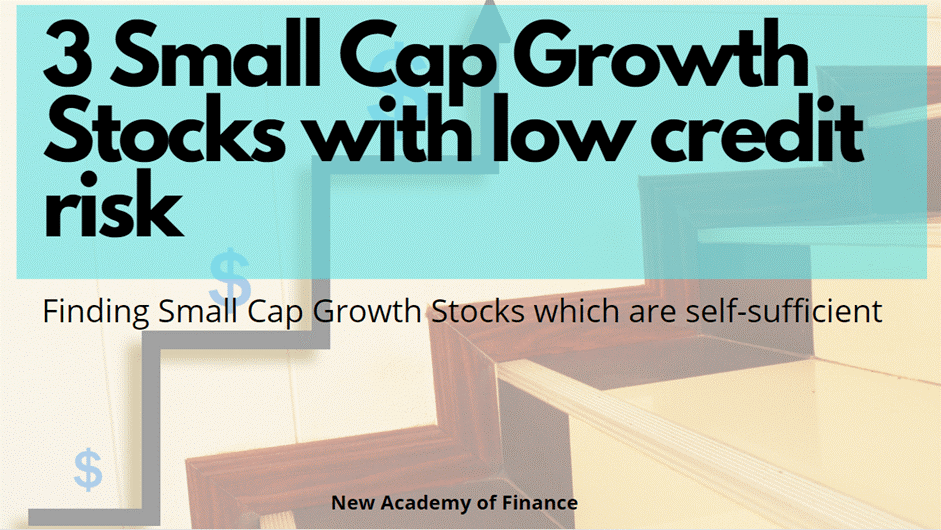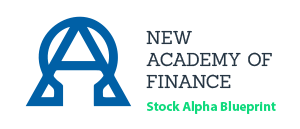Small-cap growth stocks with low debt
Just a month ago, the Fed raised interest rates by three-quarters of a percent, marking the largest hike in 20 years. We’re currently in an environment of rising interest rates due to inflation, and the market situation hasn’t exactly been the best.
We’ve seen the NASDAQ and S&P 500 drop to a low of about 10560 and 3630 respectively as money rotated out of stocks for fear of a recessionary scenario. With current market conditions, it is imperative that we choose our investments wisely. One area which I will like to bring to my readers’ attention is a company’s use of debt.
The debt situation
At first glance, it may seem that companies with high debt would surely stand to lose big as they now have to pay more interest on their debt. However, there is a catch – in a high inflation environment, debt itself loses value as the value of money itself erodes. As such, any outstanding debt is now worth less than it was before inflation.
The push and pull factors
To summarize, we see 2 forces here – 1) interest on debt is higher due to rate hikes, but 2) debt itself is worth less due to inflation. Nevertheless, considering the decrease in spending and rotation of money into savings instead of non-essential goods and services, companies with high outstanding debt may find it more difficult to finance these obligations due to a decline in their profitability, even when their debt is worth less (remember that their cash on hand is now worth less too!).
Don’t forget that they also have to pay higher interest on their debt, even when they could potentially be generating significantly lesser cash flow due to decreased demand. In comparison, companies with low debt and strong cash flows are less vulnerable to rate hikes as they can easily finance these obligations even if their profits stall due to less consumption of their goods and services.
In addition, the company can use its cash flows to carry out mergers and acquisitions, issue dividends, repurchase shares, and/or reinvest into the company to provide better goods and services; companies with high debt and weak cash flows, on the other hand, do not have this flexibility.
As such, in my humble opinion, I would personally prefer to invest in companies with low debt and strong free cash flow generation where credit risk is low since the possibility of a recession is now very real.
In this article, I will highlight 3 relatively unknown companies that have strong growth potential. However, unlike many hyper-growth stocks that the media used to love, stocks such as Peloton, Palantir, Fastly, etc where these companies are typically loss-making, cash-burning entities, these small-cap stocks are highly profitable and more importantly, have extremely low credit risk due to their cash-generating abilities as well as a conservative balance sheet status.
These companies are small-cap stocks that fall under the radar but are well-positioned to potentially ride any downcycle in the economy and emerge in one piece as they have low credit risk. The same cannot be said of cash-burning hyper-growth stocks that are at risk of 3rd party funding drying up.
Do note that this is not a recommendation to be buying these shares. Please do your due diligence to decide if these small-cap stocks are suitable for you as they are inherently more volatile in terms of their price movement.
Small-cap growth stocks with low debt #1: InMode Ltd (INMD)

InMode is a medical technology company focused on beauty care and treatment. The company is best known for its treatment products for contouring, hair removal, and feminine wellness.
The company itself is an attractive pick as the beauty industry is starting to see a rebound after a steep decline caused by the pandemic. InMode is at the forefront of creating non-invasive technology for treatment products for the face and body, and it has won awards for many of its products like Evoke and EvolveX.
Stock price and financials
The company currently trades at about $23 a share, which is a far cry from its high of $99.27. As for its financials, the company has shown a sustained increase in its bottom line, with net income rising from $8.82m in 2017 to $164.97m in 2021, representing a 1770% overall increase.

We see from the graph above that revenue and earnings have been on a strong upward trend from 2018 to 2021. This is a good sign that the company is profitable and is also being run efficiently. The impressive quality of InMode’s offerings, which are said to be bringing a “paradigm shift to cosmetic procedures”, is a large reason why the company can keep its sales and net income up.
Another impressive metric to consider is the company’s free cash flow growth. The company’s free cash flow has increased from $14.42m in 2017 to $173.95m in 2021 – this is an 1106% overall increase. In comparison, the company has $62.74m in total liabilities, with only $4.5m of it being debt (ST & LT) as of 2021.

In addition, we see that the company’s earnings have beaten analyst estimates (for earnings-per-share) in the last four quarters, hence further indicating strong financial performance.
Conclusion
All in all, we see that the company is not only reporting strong earnings, but is also more than able to pay off its debt, and all its other liabilities as well. This is a good sign, especially in current times of high-interest rates, since the company has very low debt and hence low cost of debt and low cost of capital.
Given the company’s strong generation of free cash flow, InMode has the flexibility to issue dividends, buy back shares, or invest in R&D to create new non-invasive beauty treatment products. Given the high quality of InMode’s offerings, we have good reason to believe that it will continue to create new methods and technologies to provide effective beauty treatment. If you wish to invest in medical technology specifically for the beauty industry, you can put InMode on your radar.
Small-cap growth stocks with low debt #2: Quidel (QDEL)

Quidel is an American healthcare company that manufactures diagnostic healthcare products. When the pandemic hit, Quidel developed the QuickVue At-Home Covid-19 test, which has been authorized by the FDA under an Emergency Use Authorization.
Some of their other endeavors include the merging of Quidel and Ortho Clinical Diagnostics to form QuidelOrtho, a top-of-the-line in vitro diagnostics company. This new unit is built on over a century of experience, innovation, and dedication.
Stock price and financials
The company currently trades at about $107, which is a huge drop from its high of $306.72. The company has $139.23m in debt (ST & LT), but a whopping $513.15m in free cash flow as of 2021, indicating that it could pay off its total debt almost 4 times with its cash flow. As for the company’s other financials, we see that net income has grown from $74.18m in 2018 to $704.23m in 2021 – increasing almost tenfold!

Even a cursory glance at the above image is sufficient for us to know that revenue and earnings have increased massively from 2018 to 2021. In the most recent quarter, the company did almost a billion dollars in revenue, crushing analysts’ estimates of $817m.
Coronavirus-related revenues amounted to approximately $836m, indicating that there is strong demand for the company’s offerings (especially the QuickVue test). Apart from the strong growth in the company’s sales and bottom line, we observe that the company’s gross profit margin is up 74.82% in 2021. As such, we see that the company’s profitability has had a good track record and that Quidel is en route to continuing its strong financial performance.

Apart from a slight miss in Q2 2021, we see that Quidel has also been exceeding analysts’ expectations (in terms of its earnings-per-share) in recent quarters, indicating that the company is performing beyond expectations.
Conclusion
We see that this company can also thrive in a high-interest rate environment since it is more than able to pay off its debt. We also see that the company’s product offerings during the pandemic like QuickVue have contributed greatly to the company’s sales and bottom line.
In addition, the company stands to gain more in terms of profit and market share through its merger with Ortho Clinical Diagnostics. If you’re interested in exposing your portfolio to financially-healthy healthcare companies, this is a good one to consider.
Small-cap growth stocks with low debt #2: Essent Group (ESNT)

Essent Group is an insurance company offering mortgage insurance, reinsurance, and risk management products to mortgage lenders and investors. The company has an A (Excellent) rating issued by A.M. Best, which is a positive reflection of the company’s creditworthiness.
Apart from the company’s excellence in providing various products in the finance sector, it is also good to note that companies in this sector stand to gain from rate hikes due to increased profit margins. In fact, according to Investopedia, the relationship between the growth of insurance companies and interest rates is a linear one.
Stock price and financials
The company stock currently trades at about $39 a share, which is down from its highs of $55.84. As for its financials, the company has $427.8m in debt (ST & LT), but a massive $706.76m in free cash flow as of 2021.

In addition, the company’s net income has increased from $467.36m in 2018 to $681.78m in 2021 – an overall 45.9% increase. However, we can see from the image above that net income in 2020 was hit hard.
This was likely due to the pandemic which drove up delinquency rates. In fact, by the middle of 2020, the company saw a 40% increase in mortgage loan delinquencies. Yet, we see that the company managed to bounce back strongly in 2021 as countries and consumers recovered from the pandemic.

We also see from the above picture that the company has been beating analysts’ earnings-per-share estimates consistently, which is a good sign that the company’s performance exceeds expectations. In more recent news, the company has announced an increased dividend and has also authorized a share buyback worth up to $250m. This is fantastic news for investors, who now own a bigger piece of the pie and receive more passive income for holding their shares.
Conclusion
Like the above 2 companies, we see that the company can comfortably pay off its debt with its generated cash flow. We also see that the company is undertaking measures to benefit its investors by raising dividends and buying back shares. This is an extremely good sign that the company’s financials are healthy. Given the nature of the business and the consistent growth in the bottom line, Essent Group could be a worthy inclusion in your portfolio, especially during current market conditions.
Summary
Like the above 2 companies, we see that the company can comfortably pay off its debt with its generated cash flow. We also see that the company is undertaking measures to benefit its investors by raising dividends and buying back shares. This is an extremely good sign that the company’s financials are healthy. Given the nature of the business and the consistent growth in the bottom line, Essent Group could be a worthy inclusion in your portfolio, especially during current market conditions.
That concludes my three picks! Of course, please do your due diligence and find out for yourself if these investments suit your risk appetite. It’s extremely important to know exactly where you’re putting your money into, and a few good numbers on the financial statements isn’t sufficient justification to buy into a company. Nevertheless, the above picks have taken the companies’ debt, free cash flow, and bottom line into account, and could prove to be good decisions in the current market environment of rising rates.

Do Like Me on Facebook if you enjoy reading the various investment and personal finance articles at New Academy of Finance. I do post interesting articles on FB from time to time that might not be covered here in this website.
Join our Discord channel for an active discussion on all things finance!
Join our Instagram channel for more tidbits on all things finance!
Join our Youtube channel for short and sweet videos on all things finance!
SEE OUR OTHER WRITE-UPS
- Best Dividend Growth Stocks: How to become a millionaire by investing in these 6 dividend growth stocks
- How to double dividend yield using this simple strategy
- Top 5 Undervalued Small-Cap Singapore Dividend Stocks (>4% yield) (2021)
- Strong Dividend Growth Stocks Increasing Dividends by up to 19% in 2020
- 6 Blue-Chip Dividend Growth Stocks with High Dividend Growth Rate
- A list of “Best” Dividend Growth Stocks
Disclosure: The accuracy of the material found in this article cannot be guaranteed. Past performance is not an assurance of future results. This article is not to be construed as a recommendation to Buy or Sell any shares or derivative products and is solely for reference only.









